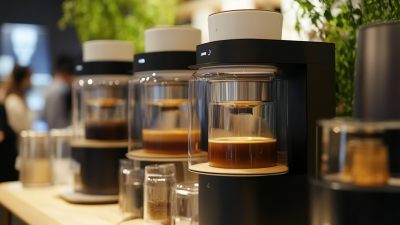Discovering the Secrets Behind the Taste of High Quality Coffee and Its Impact on Your Health
High quality coffee is more than just a morning ritual; it’s a complex beverage that offers a rich tapestry of flavors and potential health benefits. According to a report by the Specialty Coffee Association, the global demand for specialty coffee has surged, with over 60% of consumers now valuing quality over cost. This shift highlights an increasing awareness of the nuances involved in coffee production, from bean variety to brewing methods. Recent studies have shown that high quality coffee is not only rich in antioxidants but may also contribute to various health benefits, including improved cognitive function and a reduced risk of chronic diseases. Understanding the secrets behind the taste of high quality coffee can enhance your appreciation for this beloved beverage while simultaneously promoting a healthier lifestyle.

Understanding the Characteristics of High-Quality Coffee Beans
High-quality coffee begins with the selection of premium beans. The characteristics of high-quality coffee beans include their origin, variety, and processing methods. For instance, Arabica beans are often more sought after for their complex flavor profile, which includes hints of fruit, sugar, and floral notes. In contrast, Robusta beans tend to have a stronger, more bitter taste, making them a popular choice for blends. Understanding these characteristics allows coffee enthusiasts to appreciate the nuances in flavor and aroma that differentiate high-quality offerings from standard blends.
Tips: When selecting coffee, opt for single-origin beans to experience unique flavor notes that reflect their specific growing regions. Also, consider trying micro-lot coffees, which often come from small farms and offer distinct taste profiles due to their careful cultivation and processing.
The European specialty coffee market is expansive, with a diverse product range including single-origin, micro, and blended coffee. The growing trend towards high-quality coffee aligns with consumer demand for ethically sourced, flavorful options. As more businesses adapt to this trend, it’s essential to educate oneself about the origins and brewing methods that can enhance the coffee experience, ultimately impacting health positively by providing antioxidants and improving mental alertness.
The Process of Coffee roasting and Its Influence on Flavor Profile
The process of coffee roasting is a pivotal factor that shapes the flavor profile of the final brew. During roasting, green coffee beans undergo complex chemical reactions that unlock rich flavors and aromas. According to the Specialty Coffee Association, the roasting temperature can significantly affect the taste; for instance, beans roasted at higher temperatures typically produce a bolder and more intense flavor, while lower temperatures tend to highlight more delicate and fruity notes. Professional roasters often experiment within a temperature range of 200 to 250 degrees Celsius to achieve desired taste profiles, demonstrating the precise balance needed to coax out the best characteristics of the beans.
Furthermore, the duration of roasting also plays a crucial role in flavor development. The National Coffee Association reports that the average roast time ranges from 10 to 20 minutes. A shorter roasting time might result in lighter flavors, while a longer roast can introduce deeper caramelized notes and a bittersweet finish. These variations not only impact flavor but also influence the health aspects of coffee; studies suggest that darker roasts may contain lower levels of certain antioxidants compared to lighter roasts, underscoring the importance of choosing the right roast for both taste and health benefits. Understanding these elements can empower coffee enthusiasts to select brews that not only satisfy their palate but also align with their wellness goals.
Impact of Coffee Roasting Levels on Flavor Profile and Health Benefits
This chart illustrates the correlation between different coffee roasting levels, their respective flavor profiles, and potential health benefits. It highlights how light, medium, and dark roasts can influence flavor attributes such as acidity, bitterness, and sweetness, while also indicating their health impacts such as antioxidant levels.
Brewing Techniques That Enhance Coffee Taste and Aroma
Brewing techniques play a crucial role in enhancing the taste and aroma of high-quality coffee, significantly impacting the overall coffee experience. According to the Coffee Quality Institute, brewing methods such as pour-over and French press are known to extract more complex flavors from the coffee beans. For example, pour-over brewing allows for precise control over water temperature and pour rate, which can highlight a coffee's unique flavor notes, while the French press promotes full immersion, delivering a richer body and more pronounced flavors.

Furthermore, a study by the Specialty Coffee Association reveals that brewing temperature can affect the extraction process. The ideal water temperature for brewing coffee is between 195°F and 205°F. When brewed at these temperatures, coffee compounds responsible for acidity and sweetness are optimized, leading to a balanced cup. In contrast, brewing below or above this range often results in under-extraction or over-extraction, which can diminish flavor complexity and aroma. Understanding and applying these techniques can not only elevate the taste of your coffee but also optimize its health benefits, such as improved cognitive function and reduced risk of chronic diseases as indicated in various health studies.
The Health Benefits of Consuming High-Quality Coffee in Moderation
Consuming high-quality coffee in moderation can offer a range of health benefits that enhance both physical and mental well-being. Rich in antioxidants, premium coffee beans help reduce inflammation and combat oxidative stress in the body. These antioxidants, such as chlorogenic acids, may help lower the risk of chronic diseases, including heart disease and diabetes. In addition, the nutrients found in high-quality coffee, like riboflavin and potassium, contribute to overall health and can support various bodily functions.
Another notable benefit is the potential for improved cognitive function. Moderate consumption of high-quality coffee has been linked to enhanced alertness, better mood, and increased focus. The caffeine content stimulates the central nervous system, which can help combat fatigue and boost productivity. Furthermore, some studies suggest that regular coffee consumption may be associated with a lower risk of neurodegenerative diseases like Alzheimer's and Parkinson's, making it a smart choice for those looking to maintain their mental acuity as they age.
Discovering the Secrets Behind the Taste of High Quality Coffee and Its Impact on Your Health - The Health Benefits of Consuming High-Quality Coffee in Moderation
| Quality Level | Flavor Profile | Caffeine Content (mg) | Antioxidant Levels | Health Benefits |
|---|---|---|---|---|
| High | Rich, Complex, Fruity | 95 | High | Improved cognitive function, reduced risk of certain diseases |
| Medium | Smooth, Balanced, Chocolatey | 80 | Moderate | Enhanced mood, antioxidant support |
| Low | Bitter, Flat | 65 | Low | Minimal health benefits |
How to Choose Coffee That Supports Sustainable Practices and Quality
When selecting coffee that not only delights your palate but also supports sustainable practices, it's essential to consider various factors. With the global green coffee market projected to grow significantly, consumers have more choices than ever. The emphasis on quality coffee often translates to healthier options that have been ethically sourced, benefiting both the environment and farmers’ livelihoods.
Tips: Look for certifications such as Fair Trade, Organic, and Rainforest Alliance, which indicate that the coffee is produced sustainably. These certifications ensure not only a higher quality of coffee but also promote better practices in farming and trade. Additionally, opting for single-origin coffees can be a great way to explore unique flavors while supporting specific regions and their ecosystems.
Moreover, pay attention to the roasting process. Light to medium roasts tend to retain more of the natural flavors and nutrients, making them a healthier choice. By selecting coffee brands that prioritize sustainability and quality, you can enjoy your daily cup while contributing to a more eco-conscious world.

Related Posts
-

How to Choose the Best High Quality Coffee for Your Perfect Brew
-

7 Reasons Why Best Coffee for Business Boosts Employee Productivity
-

What Qualities Define the Best Coffee for Business Environments?
-

Discover the Future of Coffee: Robot Coffee Makers Shine at the 137th Canton Fair 2025
-

Ultimate Guide to Coffee Machine Hire for Events Unlocking Professional Quality Brew for Your Guests
-

Unleashing the Future: How Robot Coffee Makers Revolutionize Morning Routines
